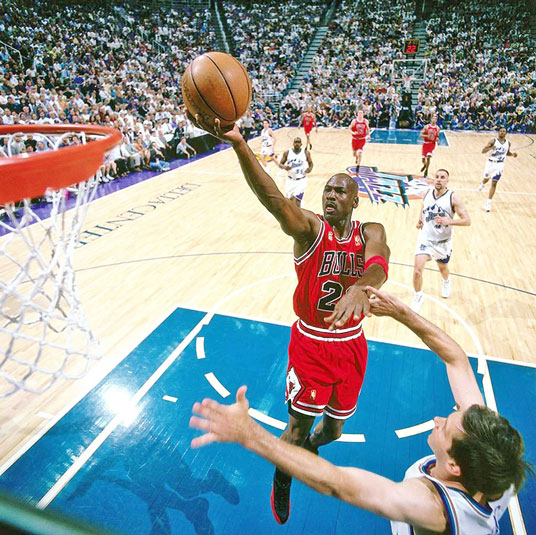Grooving to The Last Dance

In this June 11, 1997 file photo, Chicago Bulls’ Michael Jordan drives towards the rim in Game 5 of the NBA Finals against the Utah Jazz at the Delta Center. (AP)
The 10-episode documentary series The Last Dance may have wrapped up last weekend, but discussions on Michael Jordan and the Chicago Bulls’ NBA campaign in 1997-1998 continue.
Saipan Tribune talked to the islands’ basketball fans, who watched the series, or at least parts of it, and asked which part of The Last Dance got them grooving.
“I think all topics are very essential. But what I like the most is, during their run for the second 3-peat (Episode 8). With all the adversity that they had to deal with as a team and individually, yet they claimed almost the impossible feat,” said Jeff Garcia, who plays for Blue Haus.
“They managed to deal with Rodman, how he was a factor to the team, and his detours. There was also Pippen, who was undervalued for his contribution to the team and felt not compensated well. Then of course, there’s Michael Jordan, how he handled himself under pressure inside and outside the basketball court—the scrutiny and how disciplined and competitive he was,” Garcia added.
The Bulls’ bid for the second 3-peat started about a year after Jordan came out of retirement in 1995. He was away from the NBA for nearly one year and a half and returned on March 18, 1995 (game against Indiana Pacers), but failed to tow the Bulls past the Orlando Magic in the second round of the playoffs. The following season, Jordan and company were back on top and went on to win their second 3-peat.
“They still found a way to make it work as a team. It has a lot to do also with Phil Jackson’s ability to level with his star players and gain their respect,” Garcia said.
Out of the Bulls’ last three titles, two of them were against the Karl Malone and John Stockton-led Utah Jazz.
The part (Episode 9) featuring Game 5 of the 1997 NBA Finals against the Jazz stood out for Tiago Quirantes, who watched a couple of episodes of the documentary.
Game 5 was known was the “Flu Game” where Jordan despite being sick and suffering from flu-like symptom scored 38 points, including a crucial triple in their 90-88 victory that gave the Bulls the pivotal 3-2 lead in the best-of-seven title series. In was eventually revealed in the documentary that Jordan did not have a flu, but had food poisoning after eating pizza the night before Game 5.
“Whether he had flu or food poisoning, it’s just admirable that he still played and helped his team win. As a basketball player, that kind of attitude motivates me to push past my comfort zone to help my team,” said Quirantes, who plays in the suspended One Pacific Promotional Basketball League 2020.
Jon Perez, a former sports reporter of Saipan Tribune, also remembers the back-to-back title series between the Bulls and his beloved Jazz and with Jordan denying Malone and Stockton from getting an NBA ring, he does not see any reason to watch the documentary. However, he read feedback on several episodes and agreed with Jordan’s critics that his “Airness” pushed off against Bryon Russell in the crucial moments of Game 6 of the 1998 NBA Finals.
“He should have been called for the offensive foul,” said Perez, a LeBron James follower.
For Jordan fan Charlie Rivera, he liked the episodes that discussed how tough Jordan was with his teammates (Steve Kerr, Will Purdue, and Bill Wennington to name a few), as his being a “jerk” translated into championships for the team. Rivera also mentioned how Jordan fought back against players who got into his head.
“You would see him how he punished those guys defending him so hard and talking trash,” River said.
“It was just intriguing that they merely mentioned Luc Longley in the series, while Jerry Krause somehow became a villain on the team even after helping the Bulls win championships. He’s a good manager,” he added.
Meanwhile, Bea Cabrera, who played ball in the collegiate level and acknowledged that it was Jordan’s words (basketball is for anyone, boys and girls) that got her into the sport, had mixed feelings on Episodes 7 and 8 when the NBA legend call it a career.
“It wasn’t good that he was leaving the limelight at the height of his career. The sight of him setting up the play, shooting the ball, and slamming the dunk made basketball one of the best and exciting sports in the world. Fans wanted more, but it was also good because this paved the way for other basketball stars to shine,” Cabrera said.























